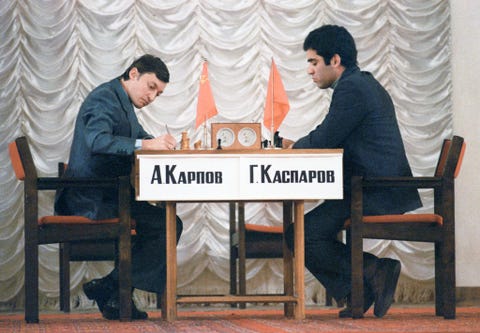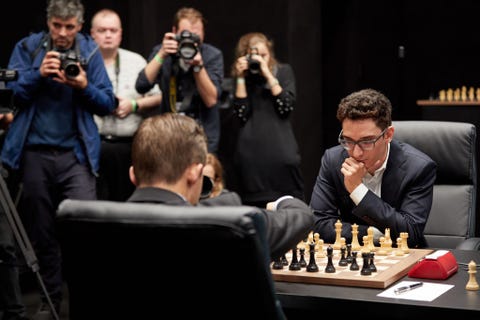Over the five months that it took to complete the 1984 World Chess Championship in Moscow (between chess legend Garry Kasparov and then champion Anatoly Karpov), Karpov reportedly lost over 22 pounds. Despite both players’ protests, the championship was called off due their physical conditions. It is, so far, the only World Chess Championship to end without a result.
The chess transformation, however, wasn’t isolated to that one tournament. The six-game championship in 2004 left Rustam Kasimdzhanov 17 pounds lighter. And in 2018, one company tracking the heart rate of grandmaster Mikhail Antipov concluded that he had burned 560 calories in just two hours. Sitting still. Playing chess. (An average-sized person would need two hours on a treadmill to break 500.)
Last week, ESPN looked more closely into the toll the stationary sport takes on the body. ESPN spoke with Robert Sapolsky, a Stanford University researcher who studies primates. Sapolsky explained that some chess players respond to the game like any elite athlete, burning upwards of 6,000 calories a day during tournaments, due to tripled breathing rates, elevated blood pressure, and muscle contractions. That means during tournaments they can lose two pounds each day.

American chess champion and world No. 2 Fabiano Caruana told ESPN that he’ll drop from 135 to 120 pounds during intense tournaments.
Marcus Rachel, a Washington University neurologist, and Philip Cryer, a metabolism expert, explained that the phenomena is a result of intense stress, which increases heart rates and causes the body to produce more oxygen. The stress might also cause players to lose appetite and sleep, both potential factors of weight loss.
These observations are now leading more chess champions to focus on the physical as well as the mental side of the game in their tournament preparation. For instance, Caruana runs, swims, and plays tennis, and his body resembles that of a collegiate track or soccer player.

The current world No. 1 chess champion, Norway’s Magnus Carlsen, sought advice from Olympic trainers after he realized his own victories were taking longer and causing more fatigue. Carlsen now runs and exercises religiously. He even hired a personal chef to travel with him and watch his macros. During matches, he chews gum to increase brain function without expanding too much energy. He’s also adjusted his posture so as not to crane his neck.
In November last year, Carlsen faced off against Caruana to defend his world title. The athletes drew in all twelve matches of the time-controlled portion, the only time the World Chess Championship history this has occurred. Finally, in a rapid-chess tie breaker, Carlsen retained his title and defeated Caruana.
Carlsen will put his body on the line again next year when the championship returns in 2020. Until then, he’ll be hitting the treadmill.
Source: Read Full Article
